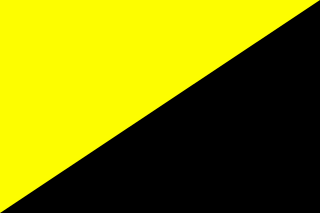
Anarcho-capitalism is an anti-statist, libertarian political philosophy and economic theory that seeks to abolish centralized states in favor of stateless societies with systems of private property enforced by private agencies, based on concepts such as the non-aggression principle, free markets and self-ownership. Anarcho-capitalist philosophy extends the concept of ownership to include control of private property as part of the self, and, in some cases, control of other people as private property. In the absence of statute, anarcho-capitalists hold that society tends to contractually self-regulate and civilize through participation in the free market, which they describe as a voluntary society involving the voluntary exchange of goods and services. In a theoretical anarcho-capitalist society the system of private property would still exist, as it would be enforced by private defense agencies and/or insurance companies selected by property owners, whose ownership rights or claims would be enforced by private defence agencies and/or insurance companies. These agencies or companies would operate competitively in a market and fulfill the roles of courts and the police, similar to a state apparatus. Some anarcho-capitalist authors have argued that slavery is compatible with anarcho-capitalist ideals.
Classical liberalism is a political tradition and a branch of liberalism that advocates free market and laissez-faire economics and civil liberties under the rule of law, with special emphasis on individual autonomy, limited government, economic freedom, political freedom and freedom of speech. Classical liberalism, contrary to liberal branches like social liberalism, looks more negatively on social policies, taxation and the state involvement in the lives of individuals, and it advocates deregulation.
Political freedom is a central concept in history and political thought and one of the most important features of democratic societies. Political freedom was described as freedom from oppression or coercion, the absence of disabling conditions for an individual and the fulfillment of enabling conditions, or the absence of life conditions of compulsion, e.g. economic compulsion, in a society. Although political freedom is often interpreted negatively as the freedom from unreasonable external constraints on action, it can also refer to the positive exercise of rights, capacities and possibilities for action and the exercise of social or group rights. The concept can also include freedom from internal constraints on political action or speech. The concept of political freedom is closely connected with the concepts of civil liberties and human rights, which in democratic societies are usually afforded legal protection from the state.
Rights are legal, social, or ethical principles of freedom or entitlement; that is, rights are the fundamental normative rules about what is allowed of people or owed to people according to some legal system, social convention, or ethical theory. Rights are of essential importance in such disciplines as law and ethics, especially theories of justice and deontology.

John Bordley Rawls was an American moral, legal and political philosopher in the modern liberal tradition. Rawls has been described as one of the most influential political philosophers of the 20th century.
Distributive justice concerns the socially just allocation of resources, goods, opportunity in a society. It is concerned with how to allocate resources fairly among members of a society, taking into account factors such as wealth, income, and social status. Often contrasted with just process, which is concerned with the administration of law, distributive justice concentrates on outcomes. This subject has been given considerable attention in philosophy and the social sciences. Theorists have developed widely different conceptions of distributive justice. These have contributed to debates around the arrangement of social, political and economic institutions to promote the just distribution of benefits and burdens within a society. Most contemporary theories of distributive justice rest on the precondition of material scarcity. From that precondition arises the need for principles to resolve competing interest and claims concerning a just or at least morally preferable distribution of scarce resources.

A Theory of Justice is a 1971 work of political philosophy and ethics by the philosopher John Rawls (1921–2002) in which the author attempts to provide a moral theory alternative to utilitarianism and that addresses the problem of distributive justice . The theory uses an updated form of Kantian philosophy and a variant form of conventional social contract theory. Rawls's theory of justice is fully a political theory of justice as opposed to other forms of justice discussed in other disciplines and contexts.
Some philosophers distinguish two types of rights, natural rights and legal rights.
Positive liberty is the possession of the power and resources to act in the context of the structural limitations of the broader society which impacts a person's ability to act, as opposed to negative liberty, which is freedom from external restraint on one's actions.
The harm principle holds that the actions of individuals should be limited only to prevent harm to other individuals. John Stuart Mill articulated the principle in the 1859 essay On Liberty, where he argued that "The only purpose for which power can be rightfully exercised over any member of a civilized community, against his will, is to prevent harm to others." An equivalent was earlier stated in France's Declaration of the Rights of Man and of the Citizen of 1789 as, "Liberty consists in the freedom to do everything which injures no one else; hence the exercise of the natural rights of each man has no limits except those which assure to the other members of the society the enjoyment of the same rights. These limits can only be determined by law." It finds earlier expression in Thomas Jefferson's 1785 "Notes on the State of Virginia," Query 17 (Religion) in which he writes, "The legitimate powers of government extend to such acts only as are injurious to others."

Self-ownership is the concept of property in one's own body, often expressed as the moral or natural right of a person to have bodily integrity meaning the exclusive right to control one's own body including one's life, where 'control' means exerting any physical interference and 'exclusive' means having the right to install and enforce a ban on other people doing this. Since the legal norm of property title claim incapacitates other people from claiming property title over the same resource at the same time, the right to control or interfere with one's own body in any arbitrary way is secured. Anarcho-capitalism defines self-ownership as the exclusive right to control one's body as long as the owner does not aggress upon others, leading to the concept of the sovereign individual. In Minarchism the 'exclusive right' is understood by separating the 'liberty-to' from the 'liberty-from' where for each person the 'liberty-to' is restricted by all the 'liberty's-from' of others, effectively subjecting the 'liberty-to' to the ban on the usage of force. Thereafter self-ownership means the exclusive right to control one's body insofar considering action between inhabitants and not involving the state, making it roughly a pacifist morality only among inhabitants. Self-ownership is a central idea in several political philosophies that emphasize individualism, such as libertarianism and liberalism.

Liberty is the state of being free within society from oppressive restrictions imposed by authority on one's way of life, behavior, or political views.
Criticism of libertarianism includes ethical, economic, environmental and pragmatic concerns. With right-libertarianism, critics have argued that laissez-faire capitalism does not necessarily produce the best or most efficient outcome, and that libertarianism's philosophy of individualism and policies of deregulation fail to prevent the abuse of natural resources. Criticism of left-libertarianism is instead mainly related to anarchism. Left and right-libertarians also engage in criticism of each other.

The non-aggression principle (NAP), also called the non-aggression axiom, is the philosophical position that states that any person is permitted to do everything with his property except aggression, defined as the initiation of forceful action, which is in turn defined as 'the application or threat of' 'physical interference or fraud ', any of which without consent. The principle is also called the non-initiation of force. The principle incorporates universal enforceability.
Libertarianism is a political philosophy that upholds liberty as a core value. Libertarians seek to maximize autonomy and political freedom, emphasizing equality before the law and civil rights to freedom of association, freedom of speech, freedom of thought and freedom of choice. Libertarians are often skeptical of or opposed to authority, state power, warfare, militarism and nationalism, but some libertarians diverge on the scope of their opposition to existing economic and political systems. Various schools of libertarian thought offer a range of views regarding the legitimate functions of state and private power. Different categorizations have been used to distinguish various forms of Libertarianism. Scholars distinguish libertarian views on the nature of property and capital, usually along left–right or socialist–capitalist lines. Libertarians of various schools were influenced by liberal ideas.
Negative and positive rights are rights that oblige either inaction or action. These obligations may be of either a legal or moral character. The notion of positive and negative rights may also be applied to liberty rights.
Right-libertarianism, also known as libertarian capitalism, or right-wing libertarianism, is a libertarian political philosophy that supports capitalist property rights and defends market distribution of natural resources and private property. The term right-libertarianism is used to distinguish this class of views on the nature of property and capital from left-libertarianism, a type of libertarianism that combines self-ownership with an egalitarian approach to property and income. In contrast to socialist libertarianism, right-libertarianism supports free-market capitalism. Like most forms of libertarianism, it supports civil liberties, especially natural law, negative rights, the non-aggression principle, and a major reversal of the modern welfare state.
Articles in social and political philosophy include:
Carol C. Gould is an American philosopher and feminist theorist. Since 2009, she has taught at City University of New York, where she is currently Distinguished Professor of Philosophy at Hunter College, and in the Doctoral Programs of Philosophy and Political Science at the CUNY Graduate Center, where she is Director of the Center for Global Ethics and Politics at the Ralph Bunche Institute. Gould is also editor-in-chief of the Journal of Social Philosophy. Her 2004 book Globalizing Democracy and Human Rights received the 2009 David Easton Award which is given by the American Political Science Association "for a book that broadens the horizons of contemporary political science." Her 2014 book Interactive Democracy: The Social Roots of Global Justice received the 2015 Joseph B. Gittler Award from the American Philosophical Association for "an outstanding scholarly contribution in the field of the philosophy of one or more of the social sciences."
James P. Sterba is an American philosopher who specializes in ethics, political philosophy and philosophy of religion.






